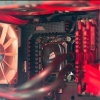Project CARS devs address AMD performance issues, AMD drivers to blame entirely, PhysX runs on CPU only, no GPU involvement whatsoever.
- Prev
- 27
- 28
- 29
- 30
- 31
- 32
- 33
- 34
- 35
- 36
- 37
- Next
- Page 32 of 40
- Prev
- 27
- 28
- 29
- 30
- 31
- 32
- 33
- 34
- 35
- 36
- 37
- Next
- Page 32 of 40

This topic is now closed to further replies.
Share
Followers
13


















